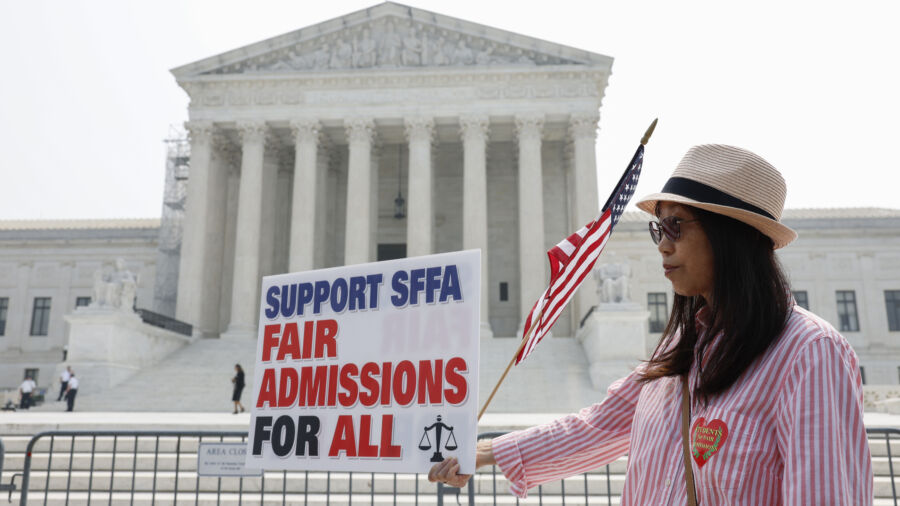A group of five Republican state attorneys general issued a letter to top law firms throughout the United States on Tuesday, warning them to discontinue any programs to hire, retain, or promote individuals based on their race.
Montana Attorney General Austin Knudsen organized the letter (pdf), which is directed at managing partners, chairs, and CEOs of American Lawyer (Am Law) 100 Firms, and warns against race-based human resource practices. Arkansas Attorney General Tim Griffin, Iowa Attorney General Brenna Bird, Kansas Attorney General Kris Kobach, and Kentucky Attorney General Daniel Cameron also signed onto the letter.
“We, the undersigned Attorneys General of five States, issue this public letter to remind you of your obligations as an employer under federal and state law. Specifically, you owe a duty to refrain from discriminating on the basis of race, whether under the label of ‘diversity, equity, and inclusion,’ or otherwise,” the letter begins. “Put simply, differential treatment based on race and skin color, even for purportedly ‘benign’ purposes, is unlawful, divisive, and exposes your firm to serious legal consequences, including potentially fines, damages, and injunctive relief.”
The warning letter comes after the U.S. Supreme Court’s decision in Students for Fair Admissions v. Harvard (SFFA). The Supreme Court ruled 6–3 to strike down race-based affirmative action policies used in college admissions practices.
It’s not entirely clear exactly which Am Law 100 Firms employ race-based human resource practices. The letter from the five Republican attorneys general does state, however, that such practices “may be commonplace among AM Law 100 firms and other large businesses.”
“Hundreds of law firms, including many of you, have sought and achieved a certification under the so-called Mansfield Rule, which asserts that its goal is to correct the perceived ‘imbalance’ of law firm leadership not ‘reflect[ing] the diversity of the workforce or society,'” the letter states.
The Mansfield Rule pertains to a diversity certification that law firms can obtain. The Mansfield Rule certification is administered by Diversity Lab and is awarded to law firms that can demonstrate that at least 30 percent of the people they consider for company leadership roles are women, people of color, LGBT individuals, and individuals with disabilities. Some law firms have also touted “Mansfield Plus Certifications,” claiming they not only considered but reached diversity benchmarks in selecting people to fill various company roles.
“These programs were already questionable before the Supreme Court’s decision in SFFA; now, they are unambiguously in tension with employer legal duties under state and federal law,” reads the letter from the five Republican attorneys general. “Indeed, American Bar Association President Mary Smith recognized that ‘[i]n the wake of the Supreme Court decision in [SFFA], the legal profession needs to review its programs and identify ways to comply with the law.’ Yet despite employing race-based policies and programs, some law firms have opted to flout the law, and indicated they were preparing to continue their efforts regardless of the Supreme Court’s ruling in SFFA.”
NTD News reached out to Diversity Lab for comment about how it handles Mansfield Rule certifications, in light of the Supreme Court decision in SFFA v. Harvard. Diversity Lab did not respond by the time this article was published.
NTD News also reached out to American Lawyer Media (ALM), which oversees the Am Law 100 Firm rankings. ALM also did not respond by the time this article was published.
Employers On Notice After Supreme Court Case
In the two months since the decision in SFFA v. Harvard, activists opposed to affirmative action policies have warned other sectors of society that certain race-based policies could come under scrutiny. In July, Mr. Knudsen and 12 other Republican attorneys general sent a letter (pdf) to the CEOs of the various Fortune 100 companies, warning that any race-based human resource policies they have could face legal challenges.
Last week, conservative legal activist Edward Blum filed a pair of lawsuits against international law firms Perkins Coie LLP and Morrison & Foerster LLP. Mr. Blum founded SFFA and brought these legal challenges against the two law firms through another entity he formed, called the American Alliance For Equal Rights (AAFER). The AAFER lawsuit alleges certain fellowship programs that Perkins Coie and Morrison & Foerster administer violate federal civil rights laws.
A group of plaintiffs working with the largest U.S. newspaper publisher, Gannett, also filed a lawsuit alleging the publisher had also flouted civil rights laws with employment policies that discouraged hiring, promoting, and retaining white employees. The complaint against Gannett also cited the Supreme Court’s decision in SFFA v. Harvard.
Gannett’s chief legal counsel Polly Grunfeld Sack defended against the allegations, writing, “Gannett always seeks to recruit and retain the most qualified individuals for all roles within the company. We will vigorously defend our practice of ensuring equal opportunities for all our valued employees against this meritless lawsuit.”

